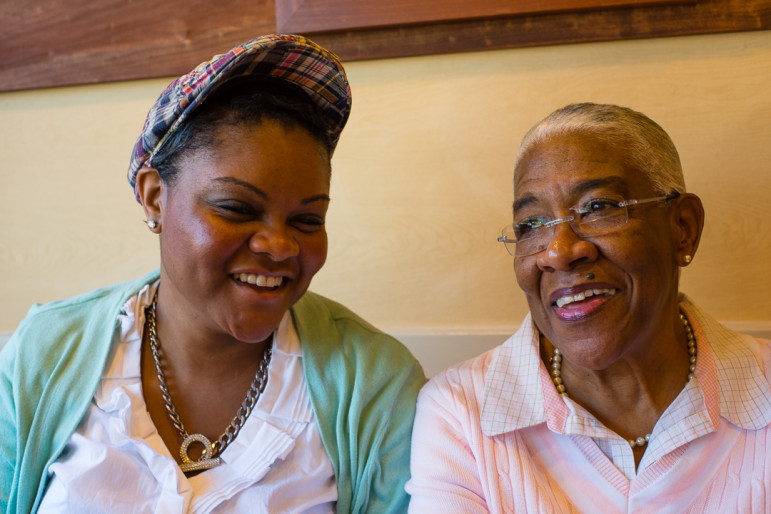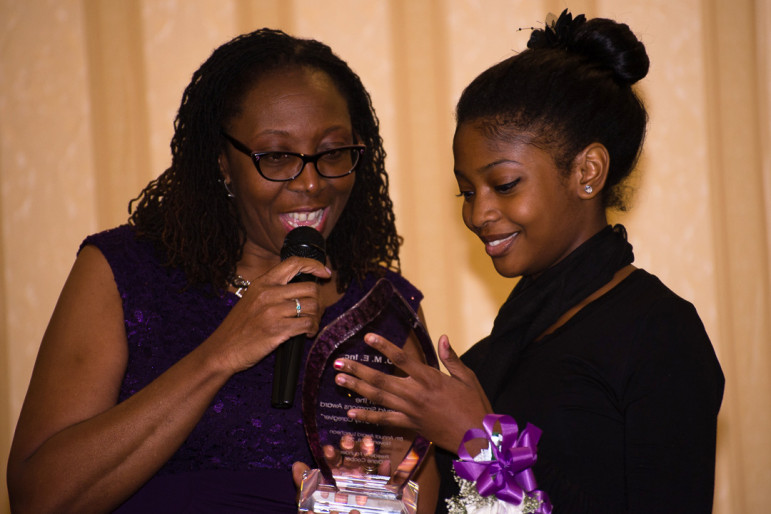
Allegra Abramo
Keyona Vincent, 31, dropped out of high school in her senior year to nurse her mother, Isaocena Vincent, through colon cancer. Her mother’s ongoing health problems have repeatedly thrust Keyona into the role of caregiver, where she often feels invisible. “People don’t ask—they see my mother, but they don’t ask, ‘How are you doing?'”
NEW YORK — When Keyona Vincent was a senior in high school, she dropped out. She wasn’t pregnant or on drugs. She didn’t have any of the other typical troubles that derail a young person’s life. In fact, she was on track to graduate from her Bronx magnet school with As and Bs. But Vincent decided one thing was more important than her education: her mother.
Isaocena Vincent had been diagnosed with colon cancer a few months earlier, and she didn’t have anyone but her daughter to shuttle her to chemotherapy appointments six days a week, care for her colostomy, or do the laundry and pay the bills. And Keyona already had experience caring for a cancer patient: Starting at age 9, she had helped nurse her father until his death from pancreatic cancer two years later.
Vincent’s story isn’t unique. At least 1.3 million American children between the ages of 8 and 18 are enlisted to care for elderly, ill and disabled family members, according to a 2005 survey, the only one of its kind in the U.S. But experts think the numbers are much higher — and growing, as the proportions of Americans over age 65 and living with chronic health conditions climbs.
For many of these children, their duties add up to a part-time job — one that can interfere with the business of growing up. A recent survey of Florida middle school students, presented in October at the American Academy of Pediatrics conference, found that youth caregivers spend an estimated 12 to 20 hours a week in that role. These children face an increased risk of anxiety, depression, substance abuse and school failure.
Yet the U.S., unlike the United Kingdom and Australia, has very few programs devoted to supporting and recognizing youth caregivers. Experts say this isolation exacerbates the stresses and risks for these young people.
While numerous organizations advocate for the estimated 60 million U.S. adults who serve as unpaid family caregivers, the Florida-based American Association of Caregiving Youth is perhaps the only program in the country focused exclusively on supporting children in this role. The association’s president and founder, Connie Siskowski, said awareness of these children remains low, and some of that might be willful ignorance.
“We’re supposed to be taking care of children, they’re not supposed to be taking care of us,” she said. “No one wants to believe that these kids exist.”
Siskowski’s assessment lines up with Keyona Vincent’s experience. She said her high school administrators didn’t want to believe or help her, and that the dean refused her request for help keeping up with her homework during her mom’s cancer.
“If one teacher could have just worked with me, I could have kept my grades up,” said Vincent, who earned her GED two years later, after her mother had stabilized.
Vincent might have felt alone, but she isn’t the only teenager to drop out due to the pressures of caregiving. More than one in five high school dropouts in a 2006 Gates Foundation survey said having to care for a family member contributed to leaving school.
It’s no surprise that many youth caregivers feel overwhelmed. They take on the roles of nurse, confidant, translator, cook, babysitter and more. Siskowski said the children she works with do everything from keeping a grandparent company to cleaning wounds, giving injections and helping someone bathe or get in and out of bed. Siskowski knows one young girl who had to take the bus to pick up her mother’s methadone, and another who hurt her wrist pushing her mother in a wheelchair.
Siskowski, who worked as a registered nurse before earning her doctorate in educational leadership, wishes families didn’t have to rely on children for this sort of help. “I really want to make it clear that we don’t advocate that children do this,” she said. “But until we have a better system in place, we want to make it as safe as possible — and to give them the support and resources to help them — so they can have success, both personally and academically.”
Making sure youth caregivers know they are not alone is one of the key supports the American Association of Caregiving Youth offers children like Isis Michalski. According to her mother, Michalski, now 15, began to shut down as she helped her mother through her latest of several bouts of cancer that began four years ago.
Then Michalski went to a lunchtime talk at her Florida school with one of the association’s counselors. She began attending weekly group sessions on topics such as stress management and confidence-building, and joined other caregivers on fishing and bowling outings.
Michalski remembers feeling nervous when she walked into the first group meeting, but that turned to relief when she realized these were other kids going through the same thing.
“I felt more connected, and I wasn’t scared anymore,” she said.
She also felt uplifted by being told how important she is. At the end of a youth caregiver weekend sleepaway camp filled with s’mores and games around the campfire, counselors gathered them for a “serious talk.”
“They told us that Camp Treasure gets its name because we, caregivers, are the hidden treasure of the world,” Michalski said. “So that’s always been one of my favorite events.”
With this kind of support, young caregivers have the potential to grow from the experience, experts say.
Lisa M. Hooper, a professor of counseling at the University of Louisville, studies children and adolescents who take on adult roles inside their families, a process called “parentification.” Most of the research on parentified youth has focused on its potential negative effects, which include poor mental health, relationship problems and substance abuse.
Some of Hooper’s recent work, however, suggests that taking on adult roles can be healthy for children in families where it’s culturally sanctioned and celebrated.
“We believe that in families where there’s some recognition, appreciation and acknowledgement that they’re engaging in these behaviors, that may buffer the child from experiencing negative outcomes,” she said.

Allegra Abramo
Faith Skerritt, 13, receives an award from the Bronx-based Caregivers Outreach Ministry Empowerment for helping to care for her autistic older brother.
Hooper said support can come from adults outside the family — a teacher, a coach or a minister — but that the child should be evaluated by a social worker or mental health professional before any intervention. That’s the model the American Association of Caregiving Youth follows.
A social worker visits each child’s home to assess their circumstances and the family’s needs, which could include medical care and equipment, in-home counseling, or basics like food, furniture and home repairs.
In New York City, organizations that have traditionally offered training and support to adult caregivers are beginning to expand their services to minors. One of these is the Caregivers Outreach Ministry Empowerment, or C.O.M.E. The nonprofit is working with schools to recruit 20 children for a pilot program funded in part by a $15,000 grant from the New Yankee Stadium Community Benefits Fund. The students will gather regularly to share their stories, speak with a social worker and simply have fun.
In early November, 250 caregivers and their families and friends gathered in a sparkling Bronx ballroom for C.O.M.E.’s annual recognition event. For the first time in its eight-year history, the organization included two youths among its honorees.
One of these was Faith Skerritt, 13, who helps feed, dress and supervise her 22-year-old autistic brother. Her responsibilities have grown since her older sister went off to college last year, and she admitted that sometimes, as the youngest child, she craves a little more attention. But she insisted that helping her brother isn’t a big deal.
“I don’t need a reward for it,” she said.
She got one anyway. Faith walked hand-in-hand with her mother to the podium to accept a teardrop-shaped glass plaque recognizing her service to her family. Her face crumpled with emotion for a moment, then she regained her composure as she took the microphone to offer a soft “thank you.”

























